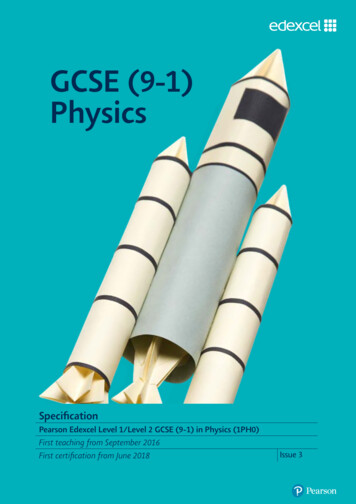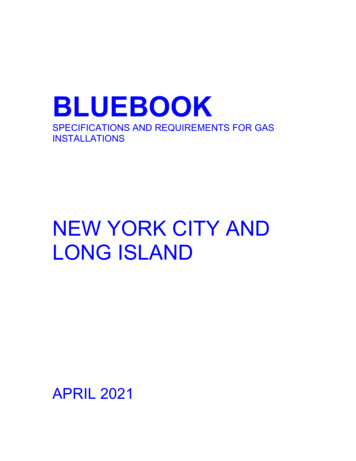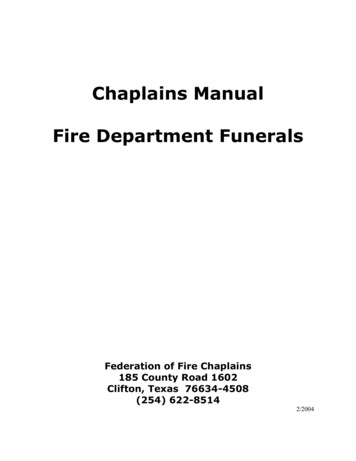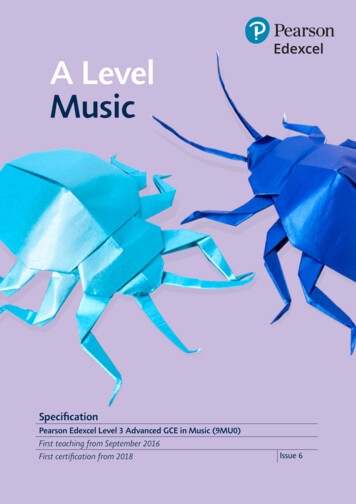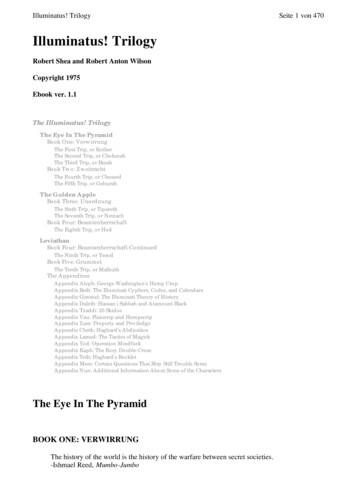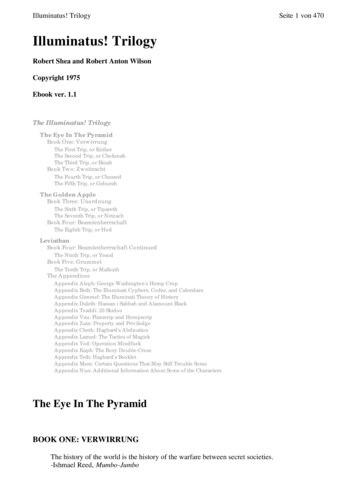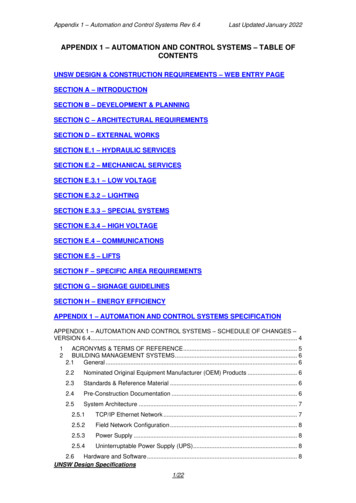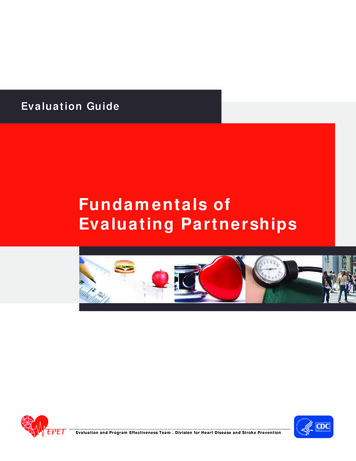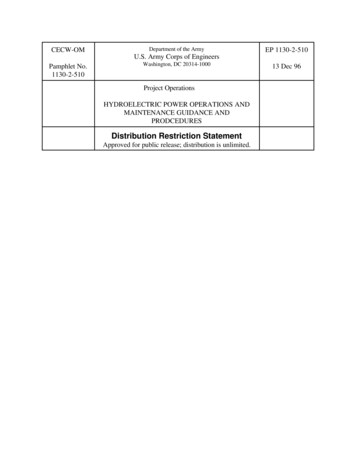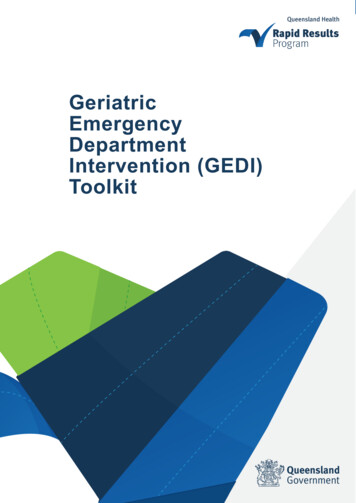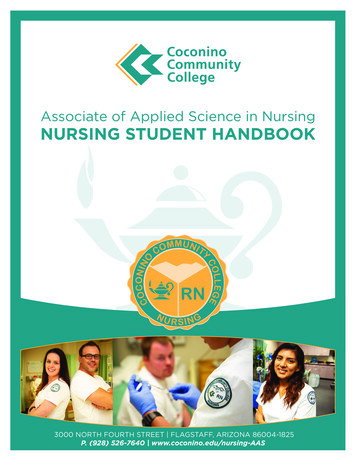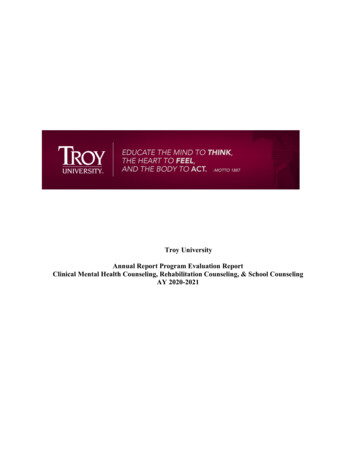
Transcription
Troy UniversityAnnual Report Program Evaluation ReportClinical Mental Health Counseling, Rehabilitation Counseling, & School CounselingAY 2020-2021
Troy University2020-2021 CACREP Annual Program Evaluation ReportClinical Mental Health Counseling, Rehabilitation Counseling, and SchoolCounselingINTRODUCTIONThe Troy University Counselor Education Program engage in yearly quantitative andqualitative program evaluations to inform systemic program changes. This evaluation processis guided by the 2009 standards from the Council for Accreditation of Counseling and RelatedEducational Programs (CACREP). The annual report is intended to provide students,administrators, field site supervisors, and other key stakeholders with information about thevital statistics, program evaluation results, and program modifications initiated for the 20192020 academic year.The Troy University Counselor Education Program is administered through the Department ofCounseling, Rehabilitation, and Interpreter Training (CRIT) in the College of Education. Dr.Sherrionda Crawford is the chair of the Department of Counseling, Rehabilitation, andInterpreter Training. The Counseling Program leads to a Master of Science or Master ofEducation degree. The program delivers 3 CACREP-accredited program areas: Master of Education: School CounselingMaster of Science: Clinical Mental Health CounselingMaster of Science: Rehabilitation CounselingThe CACREP accredited RC and SC programs are offered at the following Alabama campuses:Dothan, Montgomery, Phenix City, and Troy. The CACREP accredited CMHC program isoffered at the four Alabama campuses (Dothan, Montgomery, Phenix City, and Troy); fivelocations in Florida (Altamonte Springs, Fort Walton, Panama City, Pensacola, and Tampa); andat the Augusta, Georgia site.Core Faculty and Campus DesignationsNameDegree & okerSamanthaPhDCEPhDCESPhDCESCMHCLPC, CPCS, NCC, RPTPhenix CitySCLPCTroyCMHC, y &CounselingCMHC, SALPC, NCC, MACTroyCMHCLPC, CCMHC, MAT,CPCSPhenix City
unselingEdDCounselingPhDMarriage & FamilyCounselingPhDCEPhDCECMHC, LPC-S Alabama, LPCGeorgia, NCC, BCTMHLPC, LPC-S (AL), LPAC,CPCS (GA), SC, NCCCMHCCMHCTroyPhenix CityAltamonte SpringsLPC (AL, LA), MFT,LPC-S (LA), NCC, ACSNoneMontgomeryTroyCMHCLPC, LPC-S (AL), LPC(MI), NCC,LMHC, ACS, NCC,CCMHCLMHC, NCC, CCMHCCMHCLMHCFt. WaltonSCLPC-S (AL, TX), NCC,ACS, CertifiedCounselor (TX)MontgomeryCMHCCMHCCMHC, SCMontgomeryPanama CityTampaAugustaRCCRC, ALCMontgomeryCMHCCCMHC, LMHC,ACS, CCBTLMHC, LMFT, NCC,ACS CCTPLMHC (FL), LPC(VA)Panama CityTampaCMHCNCC, CCMHC,DCMHS-T LicensedPsychologistLPC, CPCSCMHCLMHC, LMFTAltamonte SpringsCMHCLMHC27RCCRC24CMHC, SALPC, CACII, MAC,CPCSLPC, NCC, CPCS45CMHCCMHCCMHCCMHCFt. WaltonAltamonte SpringsAugusta24
nSharonTuckerBrentUpshawAprilWillisJoelPhDEd DVocationalCounseling/SpecialEdCMHC24CMHCLMHC, NCC9RCCRC, SPHR30CMHCLMHC, NCC, RPT-S,Licensed SchoolPsychologist36CMHCLicensedPsychologist, NCC30CMHCSLPC0CMCRCLPC, CRC, NCC27PROGRAM ASSESSMENT AND EVALUATIONSEach year the Department of Counseling, Rehabilitation, and Interpreter Training hold an annualmeeting in conjunction with the university’s convocation activities. Each year the departmentreviews student learning outcome data and makes recommendations for improvement. Programaggregate and disaggregated data by location are reviewed.The following is the tentative timeline for the remaining assessment yFebruaryAnnual CRIT Division MeetingFaculty Review of Findings & Plans for ImprovementCounseling Curriculum Committee (CCC) MeetingConsolidate Plans for ImprovementCCC Meeting: Review Consolidated Plans for Improvement & ProgramModificationsAdvisory Board MeetingsReview of Findings & Plans for ImprovementRecommendations & ModificationsReview and compile Site Supervisor Evaluations andPracticum/Internship EvaluationsReview CPCE ScoresTwo-Year Graduate Follow-Up Survey (GFS) (Conduct in years ending inodd numbers)Review Exit SurveyVital Statistics
MarchEmployer Survey (Conduct in years ending in odd numbers)Faculty Review of Syllabi & Common AssignmentsAprilCCC Meeting: Review GFS & Employer Survey DataPlans for Improvement & Program ModificationsMayJuneCCC Meeting: Plans for Improvement & Program ModificationsJulyDevelop annual assessment report and distributeADVISORY BOARD MEETINGSAdvisory Board meetings are held at each campus location. In general, the feedback from thelocation Advisory Board Members indicates that Troy University Counseling Students are wellprepared to work with clients in a variety of settings. Areas for improvement include exposure toelectronic medical records and extra crisis training. The chart below provides the meeting dates,discussion items, and resulting program modifications.CampusLocationDothanDatesAgenda ItemsResulting ProgramModificationsContinue marketing tobring in rehab studentsfor the grant.12/9/21Montgomery5/21/21Phenix City4/29/21-Program overview. CACREP accreditedstill in place.-Considering an online program format.-Fall 2021 we are moving the 2016CACREP Standards- Rehab moved from 48-60 hours Fall 2021-COVID and enrollmentNoneTroy5/2019,NoneAugusta4/28/22-Update on enrollment-Review of Undergraduate RehabPrograms-Faculty changes-2-year CACREP certification-Mission statement for program andspecialty areas-Updates on student enrollment andscholarship options.-Rehab graduate enrollment up by 3%-Updates on CACREP accreditation.-Mission Statement was reviewed along Nonewith program outcomes and activities-Chi Sigma Iota was also discussed, andhow community involvement can beproductive in Tau Mu Chapter activities.- Consider trauma coursefor students takingInternship
- CACREP requirements for Practicumand InternshipTroy University Corporate Partnershipand eligibility for discounted tuitionratesPensacola12/7/21Panama City9/12/21Tampa10/2021Ft. Walton3/31/22AltamonteSprings10/2019- Strengths and weaknesses of adjunctsand utilization in the programOverall, student morale and students’frustration with delayed graduationbecause of the inability to access onlineclasses- Students have taken advantage ofopportunities in suicide preventiontraining, Gottman training, and traumatreatment training.-Want a predictable path towardgraduationMission statement-Program activities-Updates on post master’s-CACREP status update-Comps and study materials-overall pleased with studentperformance-Mission statement-program objectives-previous survey results-promoting student wellness-Program changes-Mission statement-Changes to the Professional Orientationcourse-Offering a menu of options for studentsregarding what tasks would be optionsat sites for indirect and direct hours-Mission statement-Annual report data-Gap between Internship andemployment- Advisory boardmembers suggested thatstudents have resumesready when they reachout to sites and considertheir applications a jobinterview-explore options andsolutions as onlineclasses fill as soon asthey go online.-Course sequencing wascreated and utilizedsummer 2022-New faculty memberhired summer 2022NoneNone-Dr. Hall is workingtogether to createadditional training videosto accompanyPracticum/Internship forstudents-Dr. Hall agreed to revisitthe tutorial created inboth ProfessionalOrientation andResearch.-Consider adding a paneldiscussion with newprogram grads
-New 0 suicide initiative—be in amindset of assessing for safety andsuicide preventionSITE SUPERVISOR PRACTICUM/INTERNSHIP EVALUATION OF THE STUDENTSUMMARIESSite Supervisor and Practicum/Internship Evaluation results can be reviewed in brief below. Thefull report is available upon request.Clinical Mental Health CounselingNo EvidenceBelow AverageAverageMasteryExceptionalKnowledge ofopening 24%23.81%Assessment Diagnosisand %21.95%21.05%Crisis andsuicide %21.74%56.52%15.22%Specific Feedback: “Student needs to improve on writing BIRP notes and asking open ended questions.” “Student was very pleasant while interning here. She should continue to work on skillsregarding challenging clients and be confident in herself.” “Student is accomplished in all areas of counseling theory and application. If she has aneed area, it would be in knowledge of the history of counseling. This information wouldbe helpful as she prepares for his licensure exam.” “Student has been a great addition to the team. He was very coachable and willing tolearn on a daily basis. In sessions, he uses theory as a guide when working with studentsand establishing goals. He shows great empathy and has a niche for uncovering possiblesolutions.” “It was a pleasure working with student, she was able to assist the counselors in groupsetting, assist with preparing for and attend all group sessions, review all case notes andother materials for quality purpose, conducting assessments, setting up appointment andconfirming appointments as well. Mrs. Cobb was eager to learn and did not mind askingany questions. Student took her Practicum serious and was always on time. I look
forward to working with student in the future.” “More supervision and feedback with medical records.” “Student would benefit from learning the financial aspect of therapy and managing acrisis.” “Student needs more development with crisis management and assessment for suiciderisk.” “Student has progressed in his development and use of counseling facilitation skills, isable to effectively utilize supervision, and is receptive to feedback and appropriatelyimplements feedback.”School ptionalNotObservedKnowledge EthicalDevelopmentally Group EffectiveUse data toof SchoolDecision- appropriateCounselingplan/reviseCounseling makingintakesRelationships 20%48%20%4%28%64%4%0%4%14%7%3%5%13%4%Specific Feedback: “Student has great potential being employed in the area of School Counseling. She bringsto the table practical experience in the school classroom as a teacher at both the highschool and middle school grade levels. Her experience as a school teacher enhances herlevel of competence, compassion and understanding with regard to students' needs.Student is very personable. She has the ability to work well individually andcollaboratively with her colleagues and coworkers. She is also very receptive to feedbackand new ideas. She brings competence and compassion to her work and has a genuinedesire to learn and contribute. I am confident in her ability to excel in this profession.” “Student has been an asset to our school counseling program this year. She is alwayswilling to help and has very creative ideas. She immediately connects with students and
forms strong bonds to use during counseling sessions. Staff and students immediatelytrust and open up to her.” “Student is going to be a great counselor. He is able to quickly form rapport with studentsand teachers, he asks good open-ended questions and listens for the answers, and he isvery dependable. The areas marked anything less than exceptional are so marked becausewe have had limited opportunities to do those skills. I have not had the opportunity totake him into a Parent Teacher conference but will attempt to do so before the semesterends.” “The intern exceeded expectations above and beyond. She is more than capable ofhandling the role of being a school counselor.” “Student has been very strong in understanding the constraints of a school counselingenvironment in terms of resources, time, etc. which might be available to work withstudents. He does an exceptional job of applying techniques which are well-suited toboth. His demeanor with students continues to be a perfect balance of being approachableand being a safe adult professional for them. This is so key to his success with studentsfrom such wide-ranging ages and backgrounds. Our school continues to be hopeful ofhaving a fulltime spot open for him when he completes training and certification.Administration, Student Services staff, Instructional staff, families, and (of course!)students have found him to be a calm, supportive and knowledgeable resource when theyneed him.”Rehabilitation owledge ofhistory,philosophy, andlegislationaffectingrehabilitationApplication nvironmentalfactors inplanningAbility tofacilitateconsumerinvolvement indeterminingvocational goalsandcapabilitiesAbility toidentifycommunityresourceswith theconsumerto developanappropriaterehabilitation apabilitiesto makedecisionsSkill inDeveloping aTreatmentPlan0%0%0%0%0%0%0%0%0%0%0%0%0%0%
AverageAverageMasteryExceptionalNo %42.86%14.29%28.57%0%0%71.43%CPCE AGGREGATION DATA- 2018-2021 ACADEMIC YEARThe Counselor Preparation Comprehensive Examination (CPCE) consists of 160 items perCACREP content area: Human Growth & Development, Social & Cultural Foundations,Helping Relationships, Group Work, Career & Lifestyle Development, Appraisal, Research &Program Development, and Professional Orientation & Ethics.Over 330 universities and colleges utilize the CPCE; the CPCE is designed to assess counselingstudents' knowledge of counseling information viewed as important by counselor preparationprograms. Additionally, the CPCE: Allows Master’s program comprehensive exams to better meet psychometric standards. Gives programs an objective view of the knowledge level of their students. Allows programs to examine student functioning in various curricular areas. Promotes longitudinal self-study. Compares a program’s results to national data. Stimulates student integration of knowledge learned in separate courses. Gives students comparative strength/weakness feedback.The cutoff score for passing the CPCE can be no lower than one standard deviation below themean of the most recent national norm. Data from the CPCE pass rates were analyzed eachacademic year.TROY UNIVERSITY COUNSELING PROGRAMS OVERALLSubscale SectionsHuman Growth and DevelopmentSocial and Cultural DiversityCounseling and Helping RelationshipsGroup Counseling and Group WorkCareer DevelopmentAssessment and TestingResearch and Program EvaluationProfessional Counseling Orientation and 7262.5872.597OverallTotal ScoresMIN33MAX121M73.6SD13.839
CPCE Pass/FailCumulative Troy TotalsN1037NP387NF650Pass %37%DOTHAN CAMPUSSubscale SectionsHuman Growth and DevelopmentSocial and Cultural DiversityCounseling and Helping RelationshipsGroup Counseling and Group WorkCareer DevelopmentAssessment and TestingResearch and Program EvaluationProfessional Counseling Orientation and 2.591OverallTotal ScoresMIN49MAX99M68.5SD12.046N74NP33NF36Pass %47CPCE Pass/FailCumulative Troy TotalsMONTGOMERY CAMPUSSubscale SectionsHuman Growth and DevelopmentSocial and Cultural DiversityCounseling and Helping RelationshipsGroup Counseling and Group WorkCareer DevelopmentAssessment and TestingResearch and Program EvaluationProfessional Counseling Orientation and 332.5032.624OverallTotal ScoresMIN33MAX105M68.7SD12.276CPCE Pass/FailCumulative Troy TotalsN159NP34NF125Pass %21%
PHENIX CITY CAMPUSSubscale SectionsHuman Growth and DevelopmentSocial and Cultural DiversityCounseling and Helping RelationshipsGroup Counseling and Group WorkCareer DevelopmentAssessment and TestingResearch and Program EvaluationProfessional Counseling Orientation and 872.597OverallTotal ScoresMIN38MAX107M70.2SD12.951CPCE Pass/FailCumulative Troy TotalsN133NP37NF96Pass %30%ALTAMONTE SPRINGS CAMPUSSubscale SectionsHuman Growth and DevelopmentSocial and Cultural DiversityCounseling and Helping RelationshipsGroup Counseling and Group WorkCareer DevelopmentAssessment and TestingResearch and Program EvaluationProfessional Counseling Orientation and .4722.240OverallTotal ScoresMIN42MAX101M74.9SD11.752CPCE Pass/FailCumulative Troy TotalsN114NP43NF71Pass %33%
AUGUSTA CAMPUSSubscale SectionsHuman Growth and DevelopmentSocial and Cultural DiversityCounseling and Helping RelationshipsGroup Counseling and Group WorkCareer DevelopmentAssessment and TestingResearch and Program EvaluationProfessional Counseling Orientation and 2.4572.509OverallTotal ScoresMIN37MAX98M67.7SD12.744CPCE Pass/FailCumulative Troy TotalsN101NP21NF83Pass %21%FT. WALTON CAMPUSSectionHuman Growth and DevelopmentSocial and Cultural DiversityCounseling and Helping RelationshipsGroup Counseling and Group WorkCareer DevelopmentAssessment and TestingResearch and Program EvaluationProfessional Counseling Orientation and .9012.5402.804OverallTotal ScoresMIN51MAX120M79.2SD14.590N59NP30NF29Pass %51%CPCE Pass/FailCumulative Troy Totals
PANAMA CITY CAMPUSSectionHuman Growth and DevelopmentSocial and Cultural DiversityCounseling and Helping RelationshipsGroup Counseling and Group WorkCareer DevelopmentAssessment and TestingResearch and Program EvaluationProfessional Counseling Orientation and 8.89.79.810.310.39.59.6SDOverallTotal ScoresMIN44MAX112M79SD14.902N57NP33NF24Pass %58%CPCE Pass/FailCumulative Troy TotalsPENSACOLA CAMPUSSectionHuman Growth and DevelopmentSocial and Cultural DiversityCounseling and Helping RelationshipsGroup Counseling and Group WorkCareer DevelopmentAssessment and TestingResearch and Program EvaluationProfessional Counseling Orientation and 3672.9282.069OverallTotal ScoresMIN44MAX112M79SD14.092N57NP33NF24Pass %58%MAX17M11.7SD2.454CPCE Pass/FailCumulative Troy TotalsTAMPA CAMPUSSectionHuman Growth and DevelopmentMIN3
Social and Cultural DiversityCounseling and Helping RelationshipsGroup Counseling and Group WorkCareer DevelopmentAssessment and TestingResearch and Program EvaluationProfessional Counseling Orientation and tal ScoresMIN52MAX121M80.4SD13.942CPCE Pass/FailCumulative Troy TotalsN123NP73NF50Pass %59%In response to data analysis, student evaluations, low program CPCE subscale scores in thearea of research, and the overall pass rates of the exam, the department implemented 2changes:1. The course syllabus for Research Methods (CP 6691) was revised to increase students’exposure to each component of the research process (See Artifact 4.C.1). Additionally,librarians are embedded into the Canvas courses (See Artifact 4.C.2). Each term, thefaculty member teaching the course will have an opportunity to request library supportwithin the course. Students in the course will have direct access to library help. Thelibrarian assistance includes current aid options that are available to students, such as interlibrary loans and the use of library databases. The university librarian will also work withstudents to identify and access the material being covered to augment the student’sunderstanding of the research process.2. The program’s comprehensive exam policy was modified.GRADUATE ALUMNI SURVEYThe department has used information from alumni surveys to inform programmatic change. InSpring 2021, the Troy University Graduate Alumni Survey was emailed to program graduates.The email explained that the survey's intent was to collect their views on the preparation andtraining of Troy University counseling students and that their responses would be utilized inmaking important decisions in preparing and training students in our programs. Alumni surveyresults were discussed during the Fall Convocation Meeting.The survey consisted of 46 questions and take about 15 minutes to complete. It was emailed to147 graduates. There were 82 completed responses received, which is a 56% response rate.
Results in brief (see full results for details):The three highest rated areas were: (1) knowledge of ethical/legal standards for professionalcounselors (99%), (2) “Helping Relationship Skills (97%), and (3) Diagnosis, Assessment, andTreatment (93%).The lowest rated areas were (1) meeting the needs of diverse clients, students, and consumers(90%) and research (91%).The graduates identified membership within the following counseling organizations: AmericanCounseling Association, American Mental Health Counseling Association, Association forSpiritual, Ethical and Religious Values in Counseling, Association for Play Therapy, MentalHealth Counselors of Central Florida, Chi Sigma Iota, Alabama Counseling Associations, etc.Overall, the graduates stated that the program well prepared them for the practice of professionalcounseling (94%). Specific feedback included: “The program's offerings are academically and theoretically sound, however, there areconcerns among students and potential students that the program is losing momentum asexperienced faculty are leaving the program (whether due to retirement or to pursue newopportunities).” “Yes! I have enjoyed the Troy university Counseling Program, and this counselingprogram has helped me train to be a better counselor in the future.” “The most valuable component to me has been the shared lived experiences that we havegleaned from the staff within the program. Also, the internship opportunities afforded tostudents has been invaluable. My on-site supervisor has shared her 25 years ofexperiences with me this semester and been able to help me with so many new elementsof counseling, The least valuable points have come from classes where teachers havebeen disengaged.” “Each class session was a learning opportunity which assisted me to become a bettercounselor.” “Most valuable - Professors' expertise, knowledge and experience; cohort experience; thesmall, family-like atmosphere, class availability that allows working full-time whilegoing to school Least valuable - I'm honestly having a difficult time thinking ofanything.”EMPLOYER SURVEYIn Spring 2021, the Troy University Employer Survey was sent via email to employers of
program graduates. The email explained that the survey’s intent was to collect their views relatedto the preparation and training of Troy University counseling students and that their responseswould be utilized in making important decisions in the preparation and training of students in ourprograms.The survey consisted of 17 questions and takes about 7 minutes to complete. It was emailed to 54employers. There were 7 completed responses received, which is a 12% response rate. Of thecompleted responses received, all 7 were associated with Alabama campus locations.Overall, the employers rated the program graduates as well prepared for the practice ofprofessional counselling. Specific feedback included a request for graduates to have moreexposure to documentation and brief exposure to agency requirements (Medicaid, Mental Health,DYS, DHR, enhanced training in diagnosing, and for school counselors to have more exposureto the state’s graduation requirements and reading transcripts.REVIEW OF SYLLABI AND COMMON ASSIGNMENTSIn a review of student course evaluation survey responses, students consistently indicatedthat assignment instructions in course syllabi were vague and/or confusing, theassignment rubrics didn’t appear to align with the assignment, and the number ofassignments was overwhelming. Based on student feedback and working in concert withthe CACREP Steering Committee, all course syllabi were reviewed. As a result, thefaculty recommended and implemented several changes to the master syllabi: (1) updatedand clarified assignment instructions, (2) revised the assignment rubrics to reflect theassignment objectives, and (3) decreased the number of common assignments.In the Spring 2021 the Curriculum Committee Meeting, faculty reviewed the syllabi anddetermined that several assignments were outdated due to being aligned with the 2009CACREP Standards. During these discussions, the deadline for programs to be incompliance with the 2016 CACREP Standards was also noted.The CACREP Steering Committee reviewed and revised all course syllabi to align withthe 2016 CACREP Standards. During the May 2021 CRIT Curriculum Meeting, thesyllabi were approved for a Fall 2021 implementation date.COUNSELING PROGRAM STUDENT OUTCOMES/VITAL STATISTICSCounseling Program Student Outcomes and Vital Statistics for the Troy University CounselorEducation Program are uploaded annually to CACREP. The data below reflect the vital statisticsreported to CACREP on December 2, 2019.
Program Enrollment and Completion RatesRehabilitation CounselingEnrollment50Graduates21Completion Rates97%Passed Licensure/Certification Exam67%Job Placement90%School CounselingEnrollment33Graduates8Completion Rates98%Passed Licensure/Certification Exam100%**Job Placement90%Clinical Mental Health CounselingEnrollment511Graduates118Completion Rates97%Passed Licensure/Certification Exam69%Job Placement95%**Many of the program’s school counseling graduates are working in clinical placementsor till employed as classroom teachers.Licensure or Certification Examination Pass RatePassing scores on the CPCE Comprehensive Examination or the Praxis for School Counselorsis a graduation requirement; all 219 graduates in 2019 passed at a 100% pass rate. The nationalexamination encompasses the NBCC core areas that serve as a foundation for the practice ofcounseling. Complete data are not available on licensure exam passing rates for NationalCounselor Exam (NCE) because the program doesn’t require a passing score on the NCE priorto graduation.
All School Counseling graduates (100%) became certified school counselors within six monthsof graduating from the program.
2020-2021 COMMON ASSESSMENT DATA SUMMARY
Department of Counseling, Rehabilitation, and Interpreter Training Mission Statement:The mission of the Department of Counseling, Rehabilitation, and Interpreter Training is toeducate, develop and train counseling and psychology professionals by utilizing the highestexternal standards set by state and national licensing/certifying boards. Counselor educationfaculty design and deliver counseling programs through a variety of instructional modalities. Thecounseling degree programs provide graduate education at regional and state locations. The program seeks students from diverse populations.Program Locations: Troy, Montgomery, Phenix City, Dothan, Pensacola, Panama City,Augusta, Tampa, and Altamonte SpringsPrograms: Clinical Mental Health, Rehabilitation, and School CounselingProgram Overviews:Clinical Mental Health Counseling Program Mission Statement:The Clinical Mental Health Program is designed to train mental health counselors. This 60semester hour program has been tailored to meet educational standards for state licensure andnational counseling credentials.The program is designed to provide students with knowledge of theory, application of counselingskills to various agency populations, knowledge of both normal and pathological developmentand behavior, and expertise in treatment planning.Objectives for Clinical Mental Health Counseling:The Clinical Mental Health Counseling Program seeks to prepare graduates who have achievedthe following:1. An in-depth knowledge of professional ethics, including an understanding of ethicalissues and applications2. An active professional identity as evidenced by participating in professional associations,such as the American Counseling Association3. A strong knowledge base regarding counseling facilitation skills, theories, and techniques4. An understanding of human development, both normal and abnormal5. Culturally sensitive skills to ensure the ability to work with diverse populations6. An understanding of career development and related life factors7. An understanding of theoretical and experiential concepts of group work8. An understanding of individual and group approaches to assessment and evaluations9. An understanding of research methods, statistical analysis, needs assessment, andprogram evaluationRehabilitation Counseling Mission Statement:
The mission of the Troy University Rehabilitation Counseling program is to preparerehabilitation counselors to provide rehabilitation services designed to assist individuals withdisabilities to achieve their maximum potential. In addition, services will be provided torehabilitation agenc
compliance with the 2016 CACREP Standards was noted. The CACREP Steering Committee reviewed and revised all course syllabi to align with the 2016 CACREP Standards for a Fall 2021 implementation date. To align with CACREP requirements the School Counseling Program moved from a 48-semester hour program to a 60-semester hour program,
